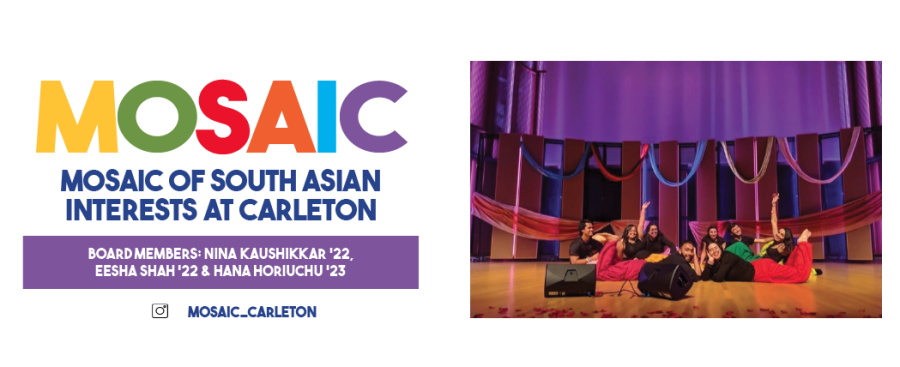Nina Kaushikkar ’22 grew up just outside of Chicago. While the greater Chicago area has pockets of South Asian communities, this wasn’t the case in Kaushikkar’s hometown. Still, as the daughter of two Indian immigrants, Kaushikkar had always felt a strong connection towards her cultural background.
“When I came to Carleton, I knew that was an absence I wanted to make up for,” she said. So she joined Mosaic of South Asian Interests at Carleton (MOSAIC).
Eesha Shah ‘22, whose parents are also from India, grew up in an Iowa town with a strong Indian community.
“At Carleton, other than MOSAIC, there’s little cultural experience. And it can feel like something is missing if you don’t have that, especially because I always had cultural ties growing up and in high school,” said Shah. She joined MOSAIC after meeting Kaushikkar in her freshman winter.
Hana Horiuchi ’23 is half-Indian and visited India every summer pre-pandemic. She grew up in Queens, one of the most ethnically diverse urban areas in the world.
“I’ve been surrounded by communities of color, so, when I came to Carleton, I knew I wanted to seek that out,” said Horiuchi. “Especially looking at Carleton’s diversity stats, it was something I was daunted by. I made an effort to have this community, especially through my transition as a first-year.”
Now, Kaushikkar, Shah and Horiuchi make up MOSAIC’s board. Preserving a sense of cultural community, especially for incoming students, is a motivator for each of them.
“I love MOSAIC, and I knew I wanted to be part of MOSAIC consistently, for the rest of my time at Carleton,” said Horiuchi. “[Becoming a Board Member] seemed like a natural thing to do.”
MOSAIC’s programming—like all other aspects of life—was disrupted by the pandemic. The group adapted by using Zoom and transitioning to outdoor meetings as students got vaccinated last spring.
Moreover, in June, as COVID became increasingly dire in India, MOSAIC fundraised $4655.20 through Venmo donations and a bake sale. They split this money between two charities: Khaana Chahiye and Khalsa Aid.
With a return to semi-normal this term, MOSAIC has been hosting weekly Chai Times in the Cassat Lounge on Sundays from 4 to 6 p.m. According to Shah, these meetings are “sometimes a space for serious conversations, mostly a space for forming connections and having that community.”
The board estimates that Chai Times have drawn an average of 20 to 30 people, though the club has no fixed membership. Meanwhile, big events planned by MOSAIC have historically been attended by upwards of 200.
This year, Diwali—a festival of lights celebrated by Hindus, Jains, Sikhs and some Buddhists—fell on Thursday, Nov. 4. MOSAIC is planning a celebration open to the entire Carleton community in the Great Hall on Saturday, Nov. 6, at 5:30 p.m. Prior to the full event, there will also be a small religious service.
“We decided to do that because there’s not a big space for religion in terms of Diwali outside of the event. But doing it in front of an audience feels performative and kind of inauthentic,” said Shah. “We’re going to be doing that before the audience gets there, so there’s a space for people who do want to celebrate Diwali religiously.”
Carleton community members are all encouraged to attend the celebration. They can expect a talk by St. Olaf religion professor Anantanand Rambachan, food catered by the Sri Lankan restaurant House of Curry and two dances choreographed and performanced by MOSAIC members.
Find MOSAIC on Instagram: @mosaic_carleton










